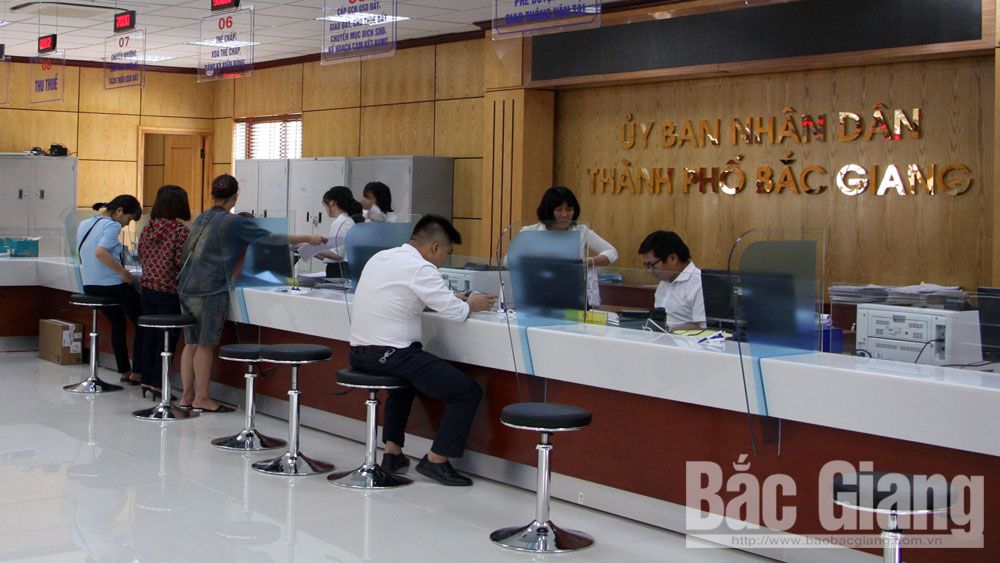Soon integrating administrative procedure settlement software systems
Removing barriers, boosting data connection
In the past, when implementing online public services, officers at the one-stop-shop section of the provincial Department of Transport had to use the shared electronic one-stop-shop software of the province developed by the provincial Department of Information and Communications in parallel with the software of the Ministry of Transport.
 |
|
Bac Giang city's one-stop-shop section pilots three-level software. |
Information on names, registering businesses, attached documents, and results of administrative procedure settlement had to be entered on both software systems, making officers very hard.
Fixing the above limitation, in August 2018, the Department of Information and Communications agreed with the Ministry of Transport to connect the two software systems together. Results of dossier processing on the online public service system will be automatically updated on the shared software of the province.
Over the past time, the administrative procedures of three levels (province, district and commune) have not been connected because the software systems are not integrated. In order to ensure the regulation compliance, the provincial IT Steering Committee assigned the Department of Information and Communications to find methods to connect the software systems.
In early October 2018, the shared software of three levels (province, district and commune) was piloted at the one-stop-shop sections of the Bac Giang city People's Committee and the People's Committee of Tran Phu ward.
Through the evaluation, the function of the software has met the requirements of transferring dossiers of two and three levels among agencies in the province. The system is connected with many specialized software systems, especially the national system on business registration of the Ministry of Planning and Investment, thereby creating favorable conditions for officers in receiving and handling administrative procedures.
After evaluating the effectiveness of the pilot shared software from now to November 2019, the province will expand the model to the remaining district- and communal-level one-stop-shop sections across the province.
Ensuring architectural framework
According to the evaluation of the provincial IT Steering Committee, the operation of the electronic one-stop-shop systems in agencies at all levels and sectors achieved positive results compared to previous years. However, in fact, there are many shortcomings.
Duong Van Chung, Chief of the provincial Department of Justice, said in August 2018, the Ministry of Justice's judicial records management software was integrated with the shared one-stop-shop software of the province.
At present, the document receiving function of the system is running smoothly but its returning function often faces problems, not attaching files or sending decisions from specialized software.
As for the pilot software in Bac Giang city, the interfaces of some procedures are not convenient for users. The system is sometimes "suspended" and inaccessible. In addition to the integrated online software, officers at the one-stop-shop section of the Department of Transport must use specialized software to issue driving licences.
On average, they receive more than 1,000 dossiers each month so they only enter data on the software of the ministry. Therefore, it is difficult for the province to supervise the settlement of administrative procedures in this field.
Currently, the province has not yet built an integrated platform to provide connected and shared services between the internal information system of the province and the national database, so it is difficult to integrate software systems.
The province sets a target of having more than 60 percent of specialized software systems and databases of departments, sectors and localities (in need) connected by 2025.
To fulfil this goal, Nguyen Gia Phong, Deputy Director of the Department of Information and Communications, said the unit will direct the professional section to promptly fix errors on the software, facilitating the people’s administrative procedure settlement.
At the same time, the department will propose the provincial People's Committee soon complete mechanisms and policies on promoting and developing the e-government of the province such as promulgating regulations and processes on integration and data exchange standards, the use of shared and specialized applications; training and developing IT human resources ...
Khoi Nguyen
 Bắc giang
Bắc giang















Reader's comments (0)